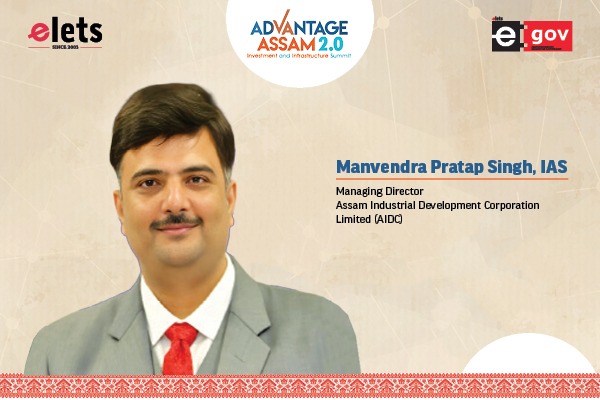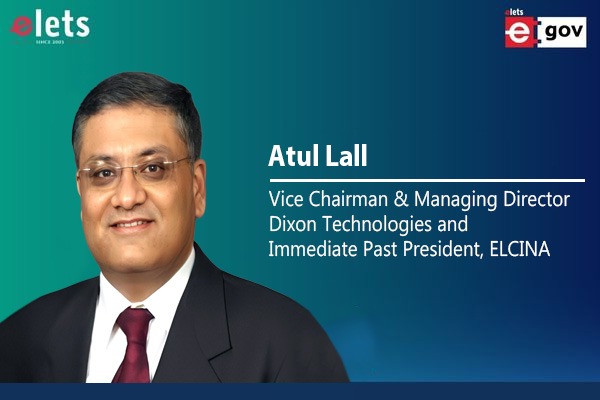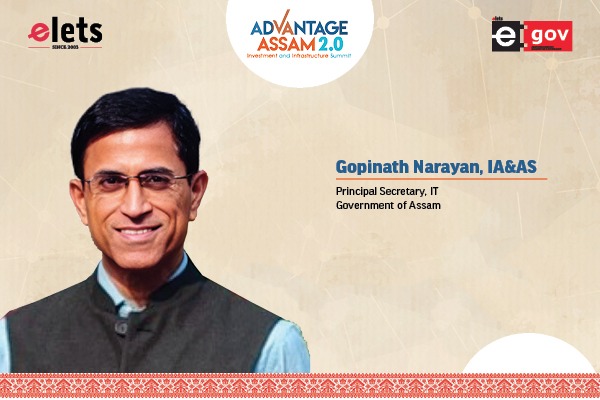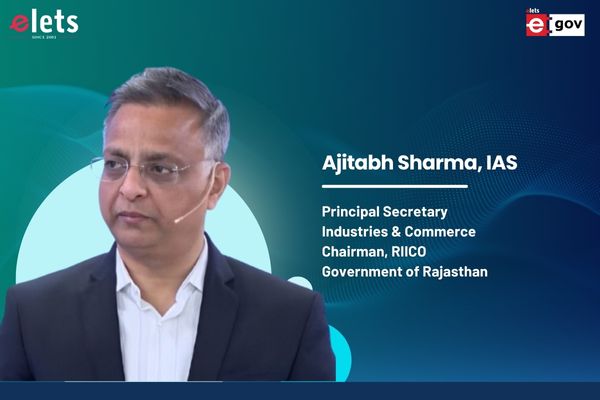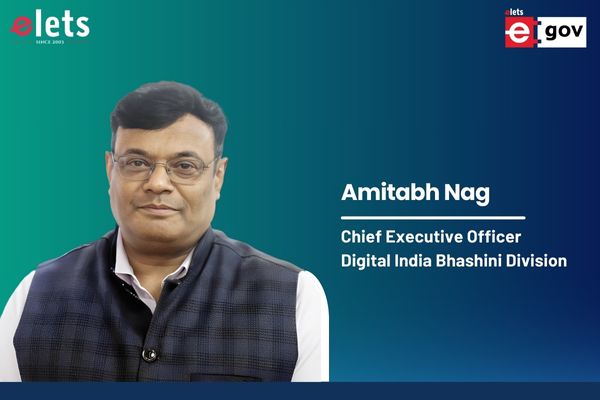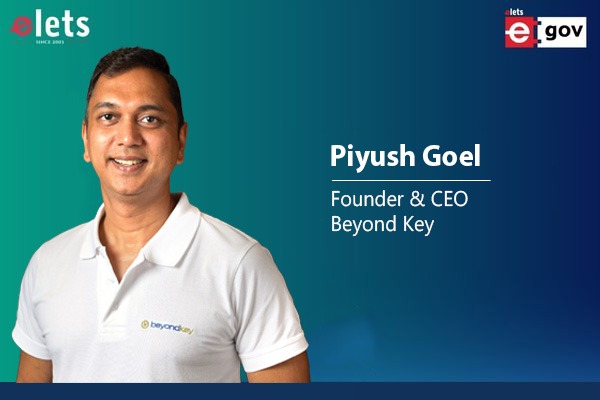
TCIL (Telecommunications Consultants India Limited) is driving India’s digital transformation through key projects under the Digital India initiative, such as the BBNL VSAT Project, smart city solutions, and 5G Use Case Labs. By integrating technologies like AI and IoT, TCIL is enhancing digital infrastructure, connectivity, and services across the country, shared Sanjeev Kumar, ITS, Chairman and Managing Director, Telecommunications Consultants India Limited (TCIL) in an exclusive interview with Elets News Network (ENN). Edited excerpts.
Could you elaborate on specific projects TCIL is currently undertaking that align with the Digital India initiative? How do these projects enhance digital infrastructure and services across the country?

TCIL is playing a pivotal role in advancing the Digital India initiative through several transformative projects aimed at boosting digital infrastructure and service delivery. A prominent initiative is the BBNL VSAT Project, which connects 5521 remote locations, including Gram Panchayats and Defense Security Posts, utilizing ISRO’s advanced High Throughput Satellites (HTS) for seamless backhaul connectivity. This project has improved digital access for schools, health centres, and government institutions in remote areas.

In parallel, the BSNL Super Edge Project upgrades IP/MPLS networks with SDN- enabled routers, enhancing BSNL’s network capacity for future services such as 4G and enterprise applications. Additionally, TCIL is implementing smart city solutions, improving urban governance and citizen services through intelligent traffic management, smart lighting, and surveillance systems. These projects demonstrate TCIL’s commitment to realizing the vision of a digitally empowered India by enhancing infrastructure and fostering digital inclusion across urban and rural landscapes.

What technological innovations are being implemented to ensure these projects meet the initiative’s goals of improving digital access, literacy, and empowerment for all citizens?

In line with the objectives of the Digital India initiative, TCIL is employing cutting- edge technologies to enhance connectivity, digital literacy, and empowerment across the nation. Through the Virtual Classroom project of Uttarakhand, TCIL has successfully enabled the technological solution for providing quality to 500 schools located in the remotest corners of the state, thereby ensuring that even the most inaccessible areas benefit from digital infrastructure.
Additionally, TCIL’s 5G Use Case Labs initiative in higher education institutions across India is a significant step forward. This program is designed to build competencies in 5G technologies, fostering academia-industry collaboration to develop solutions in fields such as healthcare, agriculture, and education. By equipping students and startups with access to state-of-the-art 5G labs, TCIL is paving the way for innovation in these sectors. These projects highlight TCIL’s role in driving technological advancements that are central to the success of the Digital India initiative, improving digital access and literacy for all citizens.
TCIL has been instrumental in bridging the digital divide in India. Can you discuss specific projects that have targeted rural and remote areas? How have these projects improved connectivity, access to services, and overall quality of life in these regions?
TCIL’s commitment to bridging the digital divide is evident through its focused efforts to bring connectivity to rural and remote areas. The BBNL VSAT Project has revolutionized connectivity for over 5521 remote locations, including Gram Panchayats, health centres, and defence posts, offering internet access through satellite-based communication networks. These efforts are crucial in enabling access to critical services such as e-governance, telemedicine, and digital education in regions previously isolated from digital infrastructure.
In Andhra Pradesh, TCIL’s work on the APSFL Project is another milestone, providing high-speed broadband to over 11,000 Gram Panchayats across 13 districts. This aerial optical fibre network has drastically improved the quality of life for rural populations by facilitating digital services in education, healthcare, and banking. TCIL’s strategic projects in underserved areas are pivotal in creating inclusive growth and ensuring equal access to digital resources for all citizens.
The Digital Coast Guard project is a significant undertaking for TCIL. Could you detail the scope of this project, including its main components such as the Data Centre, Disaster Recovery Data Centre, and enhanced connectivity?
The Digital Coast Guard Project is one of TCIL’s most ambitious undertakings, aimed at modernizing the Indian Coast Guard’s operations through the establishment of a robust IT infrastructure. The project includes the development of a Data Centre, a Disaster Recovery Data Centre, and a Near Line Data Centre, all certified to Tier-III standards by the Uptime Institute. These centres will support real-time data processing, secure communications, and operational continuity for the Coast Guard’s mission-critical tasks. Additionally, the project encompasses the deployment of Robo Racks on ships, allowing seamless access to ERP systems even during maritime operations. The network’s backbone, consisting of MPLS and VSAT connectivity, will link 109 nodes across the country, significantly enhancing coordination, logistics, and maritime safety. By integrating advanced IT solutions, TCIL’s Digital Coast Guard Project exemplifies the modernization of India’s defence infrastructure through digital transformation. The project is a testimonial of TCIL’s commitment to the promotion of Indigenous technologies under the vision of Atmanirbhar Bharat.
Turnkey projects are a hallmark of TCIL’s expertise. Could you describe a few recent turnkey projects, such as the ones involving MSME-ESDM centres or other significant initiatives? How have these projects impacted their respective sectors, and what were the key outcomes achieved?
TCIL’s expertise in delivering end-to- end turnkey solutions is showcased in several recent projects, including the Telangana Fiber Grid (T-Fiber) Project and the 5G Use Case Labs Initiative. In the T-Fiber Project, TCIL is providing telecom infrastructure across 10 districts in Telangana, ensuring high- speed broadband connectivity in underserved regions. This initiative will enhance digital services for rural communities, supporting e-governance, education, and healthcare initiatives. Another significant project is the rollout of 5G use case labs at 100 higher educational institutions across India, fostering innovation in 5G technology applications across sectors such as agriculture, healthcare, and education. These turnkey projects are transforming digital infrastructure in rural and urban India, enabling seamless service delivery and advancing socio-economic development. TCIL’s success in these projects underscores its ability to deliver large-scale, impactful solutions that support the nation’s digital transformation goals.
With emerging technologies such as Artificial Intelligence and the Internet of Things transforming industries, how is TCIL planning to integrate these technologies into its future projects? Can you provide examples of upcoming initiatives or pilot projects where AI and IoT will play a crucial role? What benefits do you foresee these technologies bringing to TCIL’s operations and the clients you serve?
TCIL is at the forefront of integrating emerging technologies such as Artificial Intelligence (AI) and the Internet of Things (IoT) into its future projects. One significant initiative includes the implementation of Intelligent Traffic Management Systems, which use AI for real-time incident detection, lane monitoring, and automatic number plate recognition, thereby improving urban mobility and safety. Additionally, TCIL is developing IoT-based solutions for smart cities, focusing on applications like smart energy management and water monitoring systems. These initiatives are part of TCIL’s broader strategy to harness AI and IoT to optimize infrastructure management and enhance service delivery. The adoption of these technologies will not only streamline operations but also create data-driven, sustainable solutions for the future. TCIL’s integration of AI and IoT reflects its commitment to innovation, ensuring that its projects remain at the cutting edge of technological advancements.
As TCIL continues to expand, which new sectors or industries are you planning to enter in the next five years? What opportunities do these sectors present, and why are they strategically important for TCIL’s growth?
Over the next five years, TCIL aims to expand its portfolio into emerging sectors such as e-health, fintech, and cybersecurity, in addition to strengthening its presence in telecommunications. The e-health sector presents immense opportunities, and TCIL is already leading initiatives in telemedicine, hospital management systems, and health ATMs. In fintech, TCIL is developing blockchain- based solutions for digital banking and e-KYC platforms, which will streamline banking operations and enhance security. The cybersecurity domain, particularly quantum key distribution (QKD), is another area where TCIL is pioneering new solutions to ensure secure communications. These sectors are strategically important for TCIL’s growth as they align with national priorities for digital innovation and security. By diversifying into these new industries, TCIL is positioning itself as a leader in the digital transformation space, contributing to India’s goal of becoming a global technology hub.
TCIL has received numerous accolades for its contributions to the public sector. Can you highlight specific projects or initiatives that have garnered these recognitions? How have these projects impacted national infrastructure, public services, or technological advancement? What does receiving such awards mean for the company and its stakeholders?
TCIL has earned numerous accolades for its transformative projects that have significantly impacted public services and national infrastructure. One standout project is the Vidhya Samiksha Kendra (VSK) Project, which leverages AI to enhance educational systems by providing real-time data for policymakers to improve governance in education. The success of this project in Uttarakhand and Himachal Pradesh has been widely recognized and lauded as an example of excellence in using data-driven solutions for public service enhancement.
As India strives to become a global technology hub, what role do you see TCIL playing in this journey? How can TCIL’s expertise in telecommunications and consultancy contribute to positioning India as a leader in technology and innovation? What initiatives or collaborations are you planning to support this national goal?
As India advances toward becoming a global technology hub, TCIL is positioned to play a critical role in this transformation. With its deep expertise in telecommunications and consultancy services, TCIL is spearheading projects that drive innovation in 5G, Artificial Intelligence, IoT, and quantum communications. Its ongoing collaboration with academic institutions to set up 5G Use Case Labs and partnerships with international telecom players demonstrate TCIL’s commitment to fostering technological growth on a global scale. By building next-generation digital infrastructure and facilitating research and development in emerging technologies, TCIL is contributing to India’s leadership in technology and innovation. Through strategic initiatives and collaborations, TCIL is helping to shape India’s future as a centre of excellence in global telecommunications and digital solutions.
Also Read | Driving Atmanirbhar Bharat -TCIL’s Proactive Measures for Domestic Technology Promotion
As the Chairman and Managing Director, what strategic vision do you have for TCIL’s future? How do you plan to navigate the company through industry challenges and opportunities?
As Chairman and Managing Director, my strategic vision for TCIL involves scaling up operations across emerging sectors such as AI, IoT, 5G, and cybersecurity, while continuing to deliver excellence in telecommunications and infrastructure projects. We are navigating an era of rapid digital transformation, and TCIL is poised to capitalize on these opportunities by investing in cutting-edge technologies and expanding its expertise into new industries like fintech and e-health. My vision includes fostering global collaborations, particularly in emerging economies, to strengthen our international presence and drive growth. Despite evolving market dynamics and challenges, TCIL remains committed to its core values of innovation, excellence, and sustainability, ensuring that we continue to deliver impactful projects that enhance the quality of life for citizens and contribute to India’s progress as a global technology leader.
Be a part of Elets Collaborative Initiatives. Join Us for Upcoming Events and explore business opportunities. Like us on Facebook , connect with us on LinkedIn and follow us on Twitter, Instagram.
"Exciting news! Elets technomedia is now on WhatsApp Channels Subscribe today by clicking the link and stay updated with the latest insights!" Click here!




